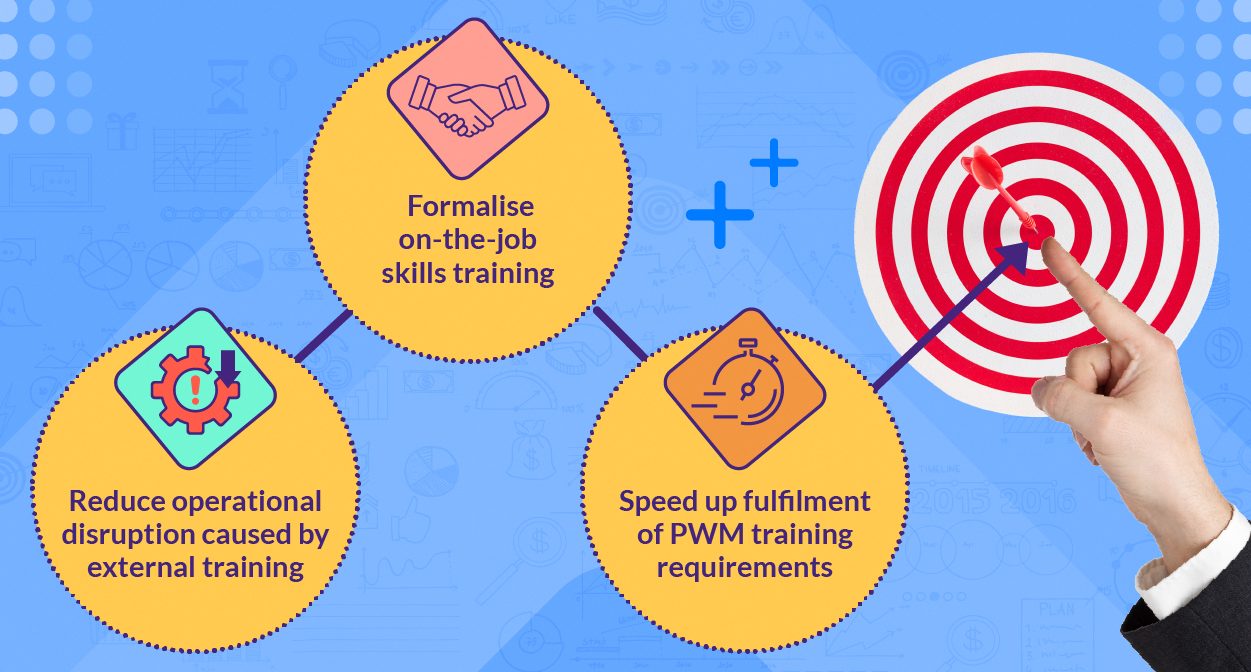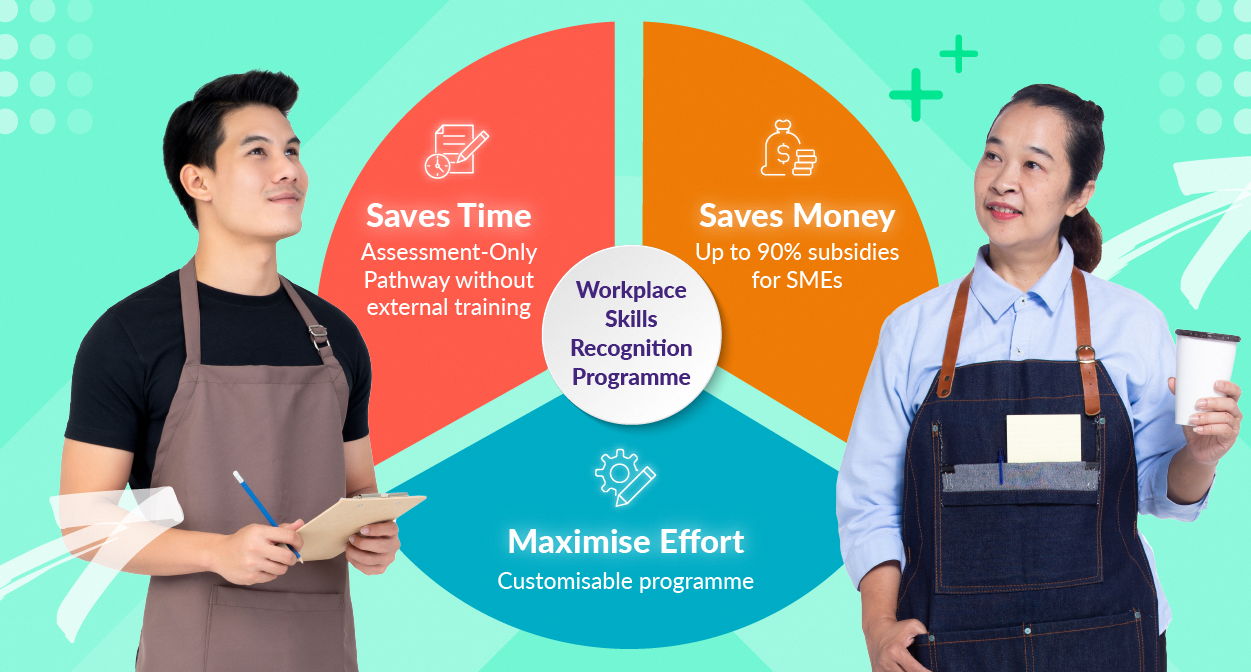Tight cash flows, a lean workforce – these are some common challenges that small and medium enterprises (SMEs) in Singapore constantly grapple with.
While SME employers do see the importance of employee upskilling, it’s hard to hit the pause button on “business as usual” and send employees for training.
The key training barrier? Business disruption, especially in manpower intensive service-related sectors, such as food services and retail.

One example is local coffee company Kings Cart Coffee, which has a staff strength of around 40 employees.
Its founder, Mr Ronald Tan, shares: “Finding the right balance between daily operations and training can be tough, as the business demands a huge number of manhours. We also have limited funds for training initiatives, so it can be challenging to
find high-quality training programmes within our budget.”
Kings Cart Coffee therefore focused on sourcing for programmes with shorter timeframes, and designated specific days to send employees for training during lull periods.
“The downside of this is that our programme choices become extremely limited,” Mr Tan says. “Off-the-shelf coffee training programmes often do not align with the unique needs of our business and customer base.”
Another pain point is the need for employees to shoulder the workload while their co-workers are away on course – and that loss of productive time can no longer be clawed back.
Facing an urgent need to upskill to remain competitive, and yet lacking the capital and human resources as compared with their larger counterparts, SMEs may feel they are squeezed from both sides.
But what if they could bring their employee training in-house – eliminating loss of productive work time, while customising a training plan that meets their unique business demands?
Addressing specific enterprise needs
Designed to do exactly that, the Workplace Skills Recognition (WPSR) programme - jointly launched by SkillsFuture Singapore (SSG), National Centre of Excellence for Workplace Learning (NACE), and National Trades Union Congress (NTUC) - aims to help employers
squarely address the lack of time in sending their employees for external training.
Mr Eric Chin, Assistant Director of SSG’s Enterprise Engagement Division, says: “Through the Workplace Skills Recognition programme, we are empowering enterprises to conduct effective learning at the workplace while facilitating the formal recognition of the skills acquired by their employees.

The premise of it is relatively straightforward. “Enterprises first attain the Workplace Learning:Ready (WPL:READY) mark that certifies they have the relevant structure to implement effective on-the-job training. With that, certified SMEs can fast-track
the skills assessment process and help their employees gain formal Workforce Skills Qualifications (WSQ) for the skills they learned at work, without the need to go for external training. This is done via the Assessment-Only Pathway, which also allows
the assessments to be done on-site, to the convenience of both the employer and employee” Mr Chin adds.
The Workplace Skills Recognition programme is the latest in a slew of SkillsFuture initiatives to help employers – especially SMEs - address specific training needs and barriers.
For example, SSG’s course fee subsidies and grants, such as the Enhanced Training Support for SMEs and the SkillsFuture Enterprise Credit, substantially lighten the load of enterprises when it comes to training costs. Initiatives such as the SkillsFuture
Work-Study Programmes and the SkillsFuture Career Transition Programmes assist companies in accessing and developing manpower talent. Resources such as the SkillsFuture Queen Bee networks, Skills Development Partners, and Jobs-Skills Insights help
enterprises identify the specific skills that can benefit their businesses and level up their workforce.
“We are constantly reviewing our programmes to enhance support for employers. The Workplace Skills Recognition programme adds on to this comprehensive suite of SkillsFuture initiatives by helping employers mitigate operational disruptions caused
by sending employees for external training. It addresses specifically employers’ complaints that they have no time for upskilling.” says Mr Chin.
Currently, the programme is being piloted in two sectors under the Progressive Wage Model (PWM) - Food Services and Retail.
Mr Chin explains: “We identified these two sectors due to their large workforce size and concentration of mature employees. The WPSR is intended to provide additional support to help SMEs in these sectors address the immediate needs to fulfil minimum
PWM training requirements and facilitate the upward progression of their employees.”
The WPSR will be expanded to more sectors, including non-PWM industries, progressively.
Building a proactive workplace learning culture
As an early adopter of the WPSR programme, Kings Cart Coffee found it a no-brainer

Mr Tan estimates that Kings Cart Coffee can save about 50 per cent in terms of time and cost as compared with sending employees for external coffee roasting courses.
He shares some initial concerns regarding joining the WPSR programme – such as the effort required to build a pool of in-house trainers, as well as the potential impact on day-to-day operations during the implementation phase.
However, several factors allayed those concerns. For one, the WPSR programme provided participating SMEs with 90 per cent funding, which significantly eased the financial burden of training workplace trainers and implementing the programme.
Mr Tan adds that another plus point was the ability to tailor the training curriculum to Kings Cart Coffee’s specific business needs. This flexibility ensured that the training content was directly relevant to the coffee business, thereby increasing
its effectiveness.
“We believe in investing in the skills and professional growth of our employees. Becoming an early adopter of WPSR allowed us to take a proactive approach to building a strong culture of workplace learning within the organisation,” Mr Tan
says.
A strong learning culture within the workplace is not a “nice to have”. There is strong evidence that such employers tend to reap better business outcomes due to increased productivity, better talent attraction and retention1, as
well as improved staff morale.
“The WPSR programme aims to materialise a win-win outcome for both the business owner and the employee. We trust that employers will see the compelling value-proposition of the WPSR to their business and their workforce, and participate in a big way,” says Mr Chin.
1 Firm-Level Returns to Employer-Sponsored Training